To help pay for the Blueprint plan through fiscal year 2027, the legislature also approved the Budget Reconciliation and Financing Act, known as the BRFA, which provides a portion of revenue through an increase in the tobacco sales tax.
According to a chart provided by the Blueprint’s Accountability and Implementation Board (AIB) that oversees the multi-billion-dollar plan, a $1.25 increase in a pack of cigarettes could generate about $86 million, while tax increases on other tobacco products could provide another $5 million in the upcoming fiscal year. The total amount of tobacco revenue is expected to decrease from $91 million to about $71 million by fiscal year 2029, because when tobacco taxes go up, tobacco use often goes down — or users look to other states with lower taxes to buy their products.

A graph summarizing some revenues to fund the Blueprint for Maryland’s Future education reform plan. Courtesy of the Blueprint Accountability and Implementation Board.
Nevertheless, an additional $76 million generated in taxes on tobacco and other products in fiscal years 2026 and 2027 would be designated toward the Blueprint fund.
In addition, the legislature approved the transfer of $40 million from the School Construction Revolving Loan Fund to the Blueprint fund.
In other parts of the budget, about $3 million is allocated for a child care career professional development fund. One purpose is to expand opportunities for those in the profession to receive formal credentials or college credit.
Part of the requirement is for individuals to work at least 20 hours per week for a period of time determined by the Officer of Child Care within the state Department of Education.
The career development legislation was sponsored by Del. Julie Palakovich Carr (D-Montgomery), but later included in a comprehensive package — House Bill 1441 — sponsored by Del. Vanessa E. Atterbeary (D-Howard), chair of the House Ways and Means Committee.
Del. Jared Solomon (D-Montgomery), who serves on the House Appropriations Committee, said Monday that child care providers who qualify for services under the Blueprint plan can receive $20,000 per child.
“Which is transformative,” he said. “Coupled with the professional development funds, it was a real sensible compromise around teacher certifications for private providers. You have now opened up new universal providers who last year didn’t feel like the Blueprint was for them.”
One of the Blueprint’s five priorities focuses on early childhood education, including the expansion of prekindergarten service to 3- and 4-year-old children. Part of the reform plan calls for a “mixed-delivery system” to serve them in public schools and in private child care centers.
Another budgetary item the legislature approved requires all 24 public school systems to allocate funding to hire Blueprint coordinators.
According to a fiscal analysis of House Bill 1082 sponsored by Del. Stephanie Smith (D-Baltimore City), a person would be hired at $150,000, including salaries and benefits, for the job. The cost would be shared between the state and each jurisdiction, but it won’t be evenly distributed.
For instance, Worcester County would pay the highest local share at $127,500 and the state $22,500.
Another jurisdiction on the Eastern Shore, Caroline County, would pay the lowest local share at $40,461, compared to the state’s $109,539.
In total, the state anticipates contributing about $2 million toward Blueprint coordinators.
The budget also provides about $290,000 for the AIB to rent office space and fill a new government affairs position.
“Overall, it was a very successful session,” Rachel Hise, executive director of the AIB, said during a Blueprint board meeting Thursday.
Not everyone agrees.
A coalition of organizations and some lawmakers pushed for The Fair Share Act, which sought to reform the state’s tax code and would have raised revenue by $1.6 billion when fully phased in.
“The General Assembly had an opportunity this session to generate the revenue we know we’re going to need down the line to do Blueprint implementation with fidelity,” said Shamoyia Gardiner, executive director of Strong Schools Maryland, an advocacy group. “By and large, while they may have generated some revenue, I think they missed the opportunity to put the state in a position where we can guarantee ourselves a world-class education. I think now it’s not quite as certain.”
By William J. Ford










